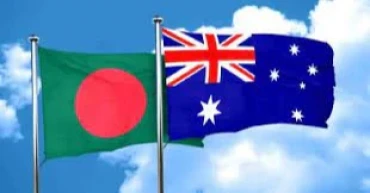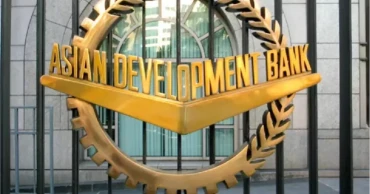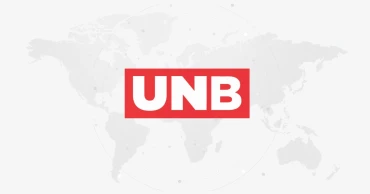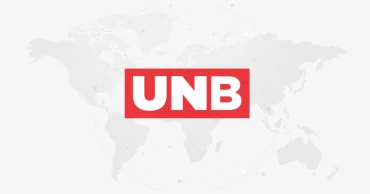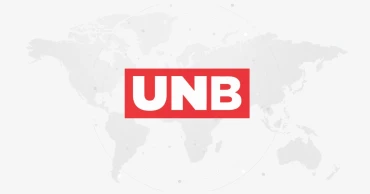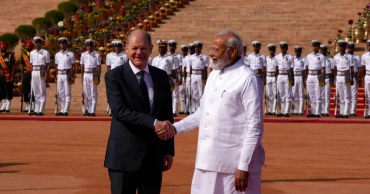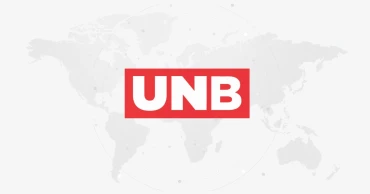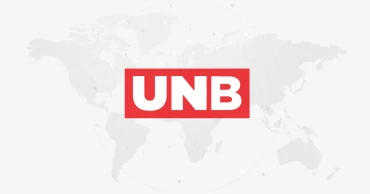support
Germany reaffirms commitment to supporting Bangladesh and Rohingya crisis solution
Parliamentary State Secretary to the German Federal Ministry for Economic Cooperation and Development (BMZ) and Member of German Bundestag, Johann Saathoff has said Germany remains firmly committed to supporting Bangladesh and the international community in seeking durable solutions for the Rohingya.
"The Rohingya people deserve the opportunity to return home voluntarily, safely, and with dignity — but lasting peace and stability in Myanmar are essential for that to happen. Until then, we will continue to stand by Bangladesh and all those working to support both refugees and host communities," he said.
Saathoff visited Bangladesh from October 27–28 to deepen bilateral relations and uphold and demonstrate Germany’s commitment to supporting Bangladesh in its development and humanitarian priorities.
Bangladesh, Pakistan pledge stronger ties to boost mutual progress
During his visit, Saathoff met senior government representatives, including Secretary of the Economic Relations Division under Ministry of Finance, Md. Shahriar Kader Siddiky, as well as representatives from the United Nations, international partners, and civil society. Discussions focused on shared priorities in sustainable development, economic growth, and the humanitarian situation in Cox’s Bazar.
Together with German Ambassador Dr. Rüdiger Lotz and a delegation from BMZ, Saathoff travelled to Cox’s Bazar to meet with representatives of Unicef and local partners, and to observe ongoing efforts supporting the Rohingyas and host communities.
The visit highlighted Germany’s continued solidarity with Bangladesh in addressing development and humanitarian challenges.
Germany continues to be one of Bangladesh’s key partners in development cooperation, focusing on climate and energy, good governance and sustainable economic growth, said the German Embassy in Dhaka on Wednesday.
4 months ago
US keen to support Syrian leaders on conditions
The Biden administration announced its readiness to support a new Syrian government that upholds minority rights, protects women, renounces terrorism, and dismantles chemical weapon stockpiles. Secretary of State Antony Blinken emphasized the importance of a smooth transition post-Assad and urged an inclusive and transparent process for determining Syria’s future, with minimal external interference.
This commitment comes after the sudden collapse of Bashar Assad's regime, led by Hayat Tahrir al-Sham (HTS), a group classified as a terrorist organization by the U.S. since 2012. While the State Department remains open to revisiting HTS's designation, discussions with the group aren't ruled out. Florida Rep. Mike Waltz, named as President-elect Donald Trump's national security adviser, noted cautious optimism about HTS's initial actions but highlighted ongoing scrutiny of its conduct.
Meanwhile, Israel has launched strikes targeting Syrian military and chemical facilities and taken control of a buffer zone in the Golan Heights, asserting national security imperatives. The U.S. expressed support for Israel's self-defense rights while reaffirming its stance on the 1974 Golan Heights disengagement agreement.
Read: Israel's Syrian buffer zone advance reveals both risks and opportunities
In parallel, Biden's national security adviser, Jake Sullivan, is engaging in discussions with Israeli officials to address the evolving Syrian situation and ongoing efforts to negotiate a ceasefire and hostage deal in Gaza. The U.S. hopes these developments will further isolate groups like Hamas and encourage negotiated solutions.
Source: With inputs from agencies
1 year ago
New program by Australia, IFC to mobilise $50 million to support post-COVID inclusive growth in Bangladesh
The IFC and the Australian High Commission in Dhaka have partnered together on a new project to help create more opportunities for inclusive and sustainable private investment flows in Bangladesh.
The Bangladesh Economic Engagement Program–Private Sector Development Partnership (BEEP-PSDP) project will support emerging needs after the COVID-19 pandemic and promote economic growth, resilience, and inclusivity by aiming to mobilize over $50 million of investment in key growth sectors.
The collaboration aligns with the Bangladesh's development plans and the partners’ strategic priorities, with a focus on revitalizing the private sector and facilitating a sustainable recovery from the COVID-19 pandemic.
"This project will build upon our strong track record in Bangladesh, while adapting to the new requirements that have arisen since the COVID-19 pandemic,” said Martin Holtmann, IFC Country Manager for Bangladesh, Bhutan, and Nepal.
“We are excited about the opportunities this project will generate for enhancing the business environment and encouraging financial access and inclusion, particularly for women.”
Jeremy Bruer, the Australian High Commissioner to Bangladesh said the partnership demonstrates their dedication to supporting economic policies, strengthening institutions, and promoting inclusive private sector development in Bangladesh.
“By working together, we can achieve a sustainable and fair recovery from the impacts of COVID-19,” he said.
Bangladesh aims to become an upper-middle-income nation by 2031 and recognises the necessity of private sector creativity, technology education, and foreign direct investment (FDI).
China lifts ban on Australian timber imports in another sign of improving bilateral relations
The BEEP-PSDP project, which is expected to run from 2023 to 2027, is intended to improve competitiveness and diversification, enhance access and inclusion, and promote sustainability and resilience in key economic areas, such as energy, agribusiness, and housing.
The project will work closely with the Government of Bangladesh, relevant ministries, and other development partners to promote public-private dialogue and collaboration for shared objectives under three pillars.
The first pillar will focus on reforming laws and regulationsto improve the business environment to attract more inclusive private investment, especially in sectors affected by COVID-19. One of its goals is to create opportunities for women entrepreneurs.
The second pillar will improve access and inclusion in the financial sector. The project will work closely with financial institutions to promote financial inclusion and speed up the transition to a greener financial sector.
Bangladesh-Australia have huge opportunities to expand trade: BGMEA President
This will include introducing new and inclusive financial products to increase access to finance, with a special focus on women borrowers and those who have limited access to banking services. The third pillar adapts and seizes strategic opportunities that fall outside the scope of the first two pillars.
2 years ago
ADB approves $400mn loan to Bangladesh to enhance revenues, reforms, help small businesses
The Asian Development Bank (ADB) on Tuesday (June 14, 2023) approved a $400 million loan to Bangladesh to advance reforms in domestic resource mobilization, improve efficiency and productivity of public spending, and help small businesses – especially women-led businesses – to access low-cost innovative bank financing.
This loan is ADB’s second subprogram of the Sustainable Economic Recovery Program that was launched in October 2021 to support economic recovery after the COVID-19 pandemic.
“This subprogram enables Bangladesh to enhance revenues, promote efficiency and transparency in public spending and public procurement, deepen the reforms of state-owned enterprises, and help small businesses and microentrepreneurs to access low-interest affordable credits from the banking sector,” said ADB Principal Public Management Economist for South Asia, Aminur Rahman.
Read: Danish Minister Dan Jørgensen in Dhaka
“The subprogram, with a strong focus on gender, climate change, and digitization, enables the government to strengthen its efforts to support income generation for the poor and vulnerable,” he added.
The program will enhance income tax collection through the adoption of the new Income Tax Act, reduce tax loopholes, strengthen compliance and enforcement measures, and broaden the country’s tax net.
Transparency and efficiency in public procurement will be enhanced through strengthening electronic procurement and electronic payment systems, while approval of public projects will be facilitated through the newly launched digital system of public project appraisal and approval process, according to ADB.
Read: Letter from 6 members of European Parliament reflects views of signatories, Ambassador tells UNB
The new package supports the launch of innovative financing services by Bangladesh Bank through commercial banks to provide low-cost microcredit using digital channels and e-wallet.
It facilitates bank lending to marginalized and landless farmers, small traders, and low-income earners. Micro and small businesses and women entrepreneurs who do not possess land or property will also be able to access finance based on their trade receipts and other forms of nonfixed collaterals, such as small equipment and machinery.
Promoting gender equality and social inclusion and addressing the climate change agenda in public investment and national budgeting are some of the key activities of this new program.
Promoting gender equality and social inclusion and addressing the climate change agenda in public investment and national budgeting are some of the key activities of this new program.
Read: UN asked to engage more effectively with Myanmar to commence Rohingya repatriation
2 years ago
DCCI urges central bank to extend support for Bangabazar fire victims
Dhaka Chamber of Commerce & Industry (DCCI) on Sunday requested Bangladesh Bank to extend support for Bangabazar fire victims, noting that thousands of small and micro businesses of Bangabazar clothing market have lost their shops with all belongings and valuables in the devastating fire that damaged the entire market on April 4.
As a result, it said, most of the traders and their allied dependents have become helpless and crippled with massive loans taken to buy stock ahead of Eid.Considering the tragedy, it is important to bring these traders within the purview of financial assistance in order for their quick rehabilitation, said the chamber body.
DCCI President Barrister Md. Sameer Sattar urged the Bangladesh Bank for intervention by issuing relevant directives and guidelines to both commercial banks and non-banking financial institutions (NBFIs) so that they can come forward to support the fire victims.
He has put forward some key recommendations on the broader spectrum which includes – waiver/reduction of interest on loans taken by these traders; providing interest free special term-loan or credit to the fire victims/business owners with low interest rate; deferring payment of loan installments; not classifying any such fire victims as loan defaulters during this time and bringing the fire victim traders under any relevant and existing refinancing schemes of the Government with easy terms and conditions.
These fiscal benefits may be allowed subject to creating a database of the fire victims and actual need assessment of these victims, he said.
The DCCI President believes that if Bangladesh Bank judiciously considers these proposals or recommendations for the victims, this will assist with the rapid rehabilitation of the affected businesses, also facilitating the livelihood of their employees.
2 years ago
UN reaffirms continued support to Bangladesh in overcoming unprecedented challenges
UN Secretary-General António Guterres has reaffirmed UN’s continued support to Bangladesh in overcoming unprecedented challenges that may arise out of the ongoing global conflicts, financial, energy and food crisis and the adverse impact of climate change.
He made the comment while meeting Foreign Minister Dr AK Abdul Momen at the United Nations Headquarters in New York recently.
The foreign minister applauded the Black Sea Grain initiative that helped countries in need to import fertilizer and cereal to tackle food crisis, according to Bangladesh Mission in the UN.
Guterres informed that some European countries, namely Latvia, Estonia, Belgium and Netherlands have adequate stockpile of raw materials of fertilizer that Bangladesh may consider to import at an affordable price.
Thanking the Secretary-General, Momen assured that Bangladesh will explore the possibility.
Appreciating Bangladesh’s extra-ordinary development trajectory under the visionary leadership of the Prime Minister Sheikh Hasina, Guterres wished that Bangladesh continues to achieve more successes in the coming years, particularity in attaining the SDGs.
He also admired the continuous leadership of Bangladesh in maintaining international peace and security as the top troops and police contributing country to the United Nations peacekeeping missions.
Also Read: Making Bangla UN's official language involves huge money: Shahriar Alam
They also discussed the Rohingya crisis and the possible way out in view of the recently adopted Security Council resolution on Myanmar.
They underscored the importance of ASEAN leadership in resolving the crisis. The UN secretary general highly appreciated Bangladesh’s generosity for sheltering 1.2 million Rohingyas and reiterated UN’s support for returning the forcibly displaced Rohingyas to their homeland in Myanmar.
Earlier, the foreign minister held meetings with Csaba Kőrösi, the President of the General Assembly (PGA); Rosemary DiCarlo, Under-Secretary General for Department of Peacebuilding and Political Affairs (DPPA); and Jean-Pierre Lacroix, Under-Secretary-General for Department of Peace Operations (DPO).
Also Read: Moscow thanks Dhaka in light of UN vote
During his meeting with the PGA, they discussed a wide range of issues particularly the proposal of Bangladesh for the establishment of a Ministerial Forum on South-South Cooperation.
Thanking the foreign minister for the above initiative, the PGA commended Bangladesh’s remarkable leadership, productive engagement and significant contribution in recent time in various processes of the United Nations and expressed his commitment to work together.
During his meeting with Under-Secretary General for DPPA, USG appreciated the important role played by Bangladesh during its Chairmanship of the United Nations Peacebuilding Commission (PBC) for 2022.
While meeting with Under-Secretary-General for Department of Peace Operations, USG praised the recently concluded bilateral agreement between Bangladesh and Gambia for joint deployment of peacekeepers in future UN Missions.
He assured that his department will promote such initiative where other countries can benefit from Bangladesh’s long-experience in peacekeeping operation.
Against this backdrop, Momen reiterated Bangladesh’s continuous commitment to UN Peacekeeping Operation and its readiness to provide more peacekeepers and equipment as and when necessary.
Among others, Permanent Representative of Bangladesh to the UN in New York Ambassador Muhammad Abdul Muhith was present at those meetings.
3 years ago
Bangladesh seeks German support to implement climate change NAP
Bangladesh has sought help from Germany to implement the National Adaptation Plan (NAP) and areas related to climate change including technology transfer, capacity building and renewable energy.
Minister of Environment, Forest and Climate Change Md Shahab Uddin had a meeting with the members of the German Parliament visiting Bangladesh along with Achim Troster, the German Ambassador to Bangladesh, at the Foreign Service Academy on Saturday.
The minister said $230 billion will be required to implement the newly formulated NAP to deal with climate change risks. It will be easier to implement if the developed world, including Germany, supports it.
Also Read: Active civil society an ‘essential element’ in democracies: German Embassy
He said that Bangladesh is implementing various projects across the country including in the Sundarbans to prevent climate change. The government is also implementing programs to implement a circular economy in waste management and set a timeline to introduce block bricks instead of burnt bricks to prevent air pollution, the minister added.
The German ambassador said that Germany's cooperation in all activities related to combating the effects of climate change and ongoing development in Bangladesh will continue at an increasing pace.
Also Read: German parliamentary delegation to visit Bangladesh from February 22-26
This cooperation will be given on the basis of mutual discussion and demand, he added.
Dr. Farhina Ahmed, Secretary, Ministry of Environment, Forest and Climate Change, Additional Secretary (Administration) Iqbal Abdullah Harun, Additional Secretary (Climate Change) Md. Moniruzzaman, Additional Secretary (Environment) Sanjay Kumar Bhowmik and Additional Secretary (Environment, Pollution Control) Md. Mizanur Rahman were present on the occasion.
3 years ago
German leader seeks Indian support for Russia's isolation
Chancellor Olaf Scholz said Saturday that Germany wants to get India to support, or at least not block, Western efforts to isolate Russia for waging a devastating war against Ukraine.
Following his talks with Indian Prime Minister Narendra Modi, Scholz stressed that developing countries were being negatively impacted by energy and food shortages resulting from the war and hopes that India will help secure critical supplies to Asia, Africa and the Americas.
Modi maintained his cautious approach and said India wanted the conflict to be ended through dialogue and diplomacy. "India is ready to make its contribution to any peace initiative," he added.
He has refrained from any overt criticism of Russia as Moscow is a major supplier of arms, oil and India’s other economic needs.
Scholz said that Russia's war against Ukraine "violated the fundamental principle to what we all agree of not changing borders through the use of violence."
Also Read: German leader Scholz arrives in India to boost economic ties
Scholz, who arrived in the Indian capital on Saturday, also discussed with Modi ways to boost bilateral economic cooperation.
He said he supported a free trade agreement between the European Union and India and he “personally will make sure that this does not drag on.”
The trip is Scholz's first official visit to India, though it is his fourth meeting with Modi since taking office in 2021, underlining Germany’s interest in reaching out to Delhi.
“There is huge potential for intensified cooperation in sectors such as renewables, hydrogen, mobility, pharma and digital economy” with India, Scholz said in an interview published by The Times of India newspaper on Saturday.
After a videoconference with fellow leaders from the Group of Seven industrial powers on Friday, Scholz said before leaving Berlin that “internationally, we are endeavoring to make clear that Russia stands alone in the world with its aggression against Ukraine.”
Philipp Ackermann, the German ambassador to India, said he understands why India is buying large quantities of oil from Russia.
"That’s something that the Indian government decides and as you get it at a very, very low price, you know I cannot blame the Indian government for buying it,” New Delhi Television cited Ackermann as saying.
Germany has been pushing to diversify its economic relations as European countries try to decouple from China, a German official said on condition of anonymity as he was not authorized to talk to reporters.
Modi said the business delegation accompanying Scholz was firming up agreements with India in digital technology, the telecommunication sector and diversification of supply chains.
Scholz reiterated that Germany welcomes skilled workers from India, especially in information technology and software industries.
"We want to benefit from the Indian talent employed in Germany in the industrial sector," he said.
India is set to receive $10.5 billion in aid by 2030 to boost the use of clean energy under agreements the two sides signed in May last year.
The two-day visit will also take Scholz to India’s information technology hub Bengaluru on Sunday.
3 years ago
Japan, UNHCR sign $4.5 million agreement to support Rohingyas in Bangladesh
The government of Japan and UNHCR have signed an agreement for the protection and assistance of Rohingya refugees in Bangladesh.
The contribution of US$ 4.5 million [JPY 600 million] will be used for reinforcement of life-saving and life-sustaining services by improving the livelihood of refugees and host communities in Cox’s Bazar and on Bhasan Char.
An exchange of notes was signed on Wednesday by Iwama Kiminori, Ambassador of Japan to Bangladesh, and Johannes van der Klaauw, UNHCR Representative in Bangladesh, said the Japanese Embassy in Dhaka on Wednesday.
Also Read: Japanese PM's special advisor for human rights issues visits Bangladesh
"This new contribution from the government of Japan for some of UNHCR’s essential protection and assistance programs as well as livelihood activities in the camps in Cox’s Bazar and on Bhasan Char comes at a critical time now that we are facing a looming funding crisis already manifest in reduced refugee access to food”, said Johannes van der Klaauw, UNHCR Representative in Bangladesh.
He said Japan is once more at the forefront of supporting UNHCR programmes in Bangladesh. “We hope this contribution will also serve as a catalyst for other donors to follow suit”.
During his visit to Cox's Bazar last month, Ambassador Iwama said he was impressed by the use of information technology for the joint management of the registration for Rohingya refugees by the Government of Bangladesh and UNHCR.
“I was also delighted to witness strengthened livelihood assistance in collaboration with a Japanese company, where Rohingya women produce sanitary goods. We will continue to engage in the solution for a voluntary, safe and sustainable return , and will cooperate with UNHCR and other humanitarian partners to achieve better living conditions for refugees and host communities.” said H.E. Iwama Kiminori, Ambassador of Japan to Bangladesh,” he said.
Also Read: Japan to provide grant aid for 2 projects
Ambassador Iwama expressed his hope that the support from the government of Japan would improve living conditions of both Rohingya and local communities.
“Also, I was profoundly touched by the tireless activities of the Government of Bangladesh, the UN agencies, and NGOs. I recognized the need for continuous support for them, and we will commit to that,” he said.
Since the large influx in August 2017, Japan has contributed over US$ 204 million to various interventions in Cox's Bazar as well as in Bhasan Char through international organizations and NGOs.
This assistance includes food assistance, healthcare, WASH, shelter, protection, and gender.
3 years ago
South Korea reaffirms its support for ultimate resolution of Rohingya crisis
Sympathizing with the diminishing hope and frustration of the Rohingyas as the repatriation to their homeland is prolonged and as the prospect is dim, South Korean Ambassador to Bangladesh Lee Jang-keun has stressed that there is no other way but to repatriate the Rohingyas to Myanmar for the ultimate resolution of the crisis.
Reaffirming Korea’s continued support for the protection of refugees forcibly relocated to Cox’s Bazar, Ambassador Lee expressed Korea’s interest in strengthening the host community, supporting the vulnerable population in particular women and children and refugees with disability.
Since the outbreak of the Rohingya refugee crisis in 2017, the government of the Republic of Korea has been supporting the operations of the UN agencies and other international organizations in Bangladesh for their humanitarian works in the refugee camp and host community including in Bashan Char.
The total amount of Korea’s funding so far is over twenty-three million US dollars. UNHCR is the biggest recipient of Korea's funding followed by UNICEF, IOM, WFP, IFRC and UNFPA. In addition to the government funding, JTS Korea, a Korean Buddhist NGO, provided a total of 200,000 gas stoves to the refugee camp in 2019 and 2022 respectively.
3 years ago


